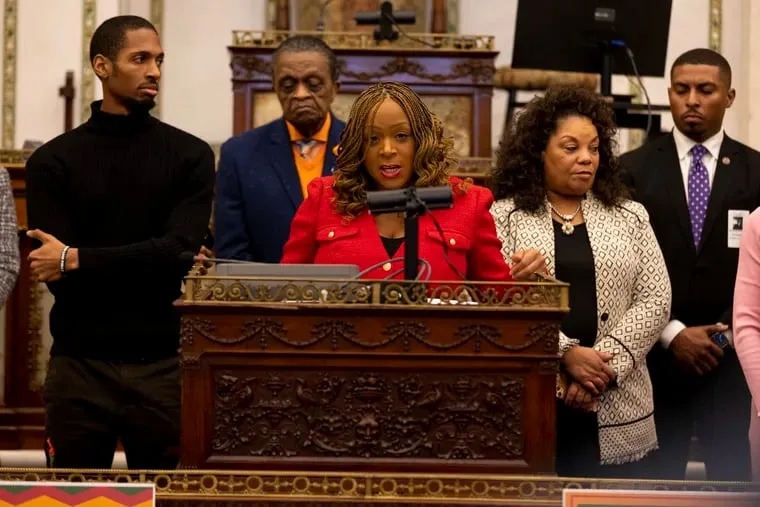
City Council members on Friday released new details about the Philadelphia Reparations Task Force and called on Black city residents to apply to join the effort.
The task force, which will launch in February, will “study and develop reparations proposals and programs for Black Philadelphians whose ancestors endured chattel slavery and Jim Crow in the United States,” according to the office of Councilmember Jamie Gauthier, who coauthored the legislation that led to the creation of the task force.
“For generations after the Civil War, General Order No. 3, and the 14th Amendment, lawmakers right here in Philadelphia and across the nation enacted and encouraged policies that subjugated Black residents to second-class citizenship,” Gauthier said at a news conference in City Hall. “While there is no way to truly eradicate past wrongs, the task force will recommend concrete steps, financial and otherwise, the city state and federal government can take to eradicate the lingering chokehold American slavery has on society.”
» READ MORE: City Council could explore reparations for Black Philadelphians
The task force will have 10 volunteer members, including cochairs Rashaun Williams and Breanna Moore, who are the leaders of the Philadelphia chapter of the National Coalition of Blacks for Reparations in America.
Williams and Moore are seeking eight more members, and they are encouraging people to apply at rep215.com. The eight seats each have specific roles, such as economic justice coordinator and health and wellness coordinator.
Board members must be “descendants of enslaved Africans in the United States, the descendants of Black, Negro, or Colored Americans since 1865, and/or the descendants of Freedmen emancipated from slavery,” according to Gauthier’s office, and they must have lived in Philadelphia for at least 10 years.
Gauthier said the task force could produce recommendations such as cash payments to descendants of enslaved people, criminal justice reform measures, or housing subsidies. They will likely require action or funding at the city, state, and federal levels.
Councilmember Kendra Brooks coauthored the legislation, which passed Council unanimously in June.
“Everyday we see the ongoing impact of slavery and racist policies on the people of Philadelphia,” Brooks said. “As a practitioner of restorative justice, I believe that we cannot escape the cycle of poverty and violence without addressing the original cause.”
Councilmember Cindy Bass and Councilmember-elect Nicolas O’Rourke also attended Friday’s announcement.
Although several cities have studied reparations, only Evanston, Ill., has enacted a program that involves financial benefits, with payments of up to $25,000 going to victims of housing discrimination or their descendants.

